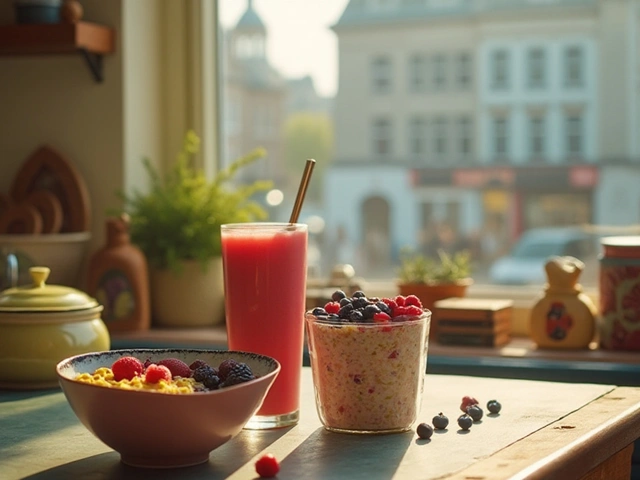Imagine a world within your body bustling with microscopic life. This ecosystem is nestled right in your gut, impacting everything from your mood to the strength of your immune system. Gut health is a captivating frontier, rich with the promise of improved well-being when nurtured mindfully.
Our gut microbiome, with its vast array of bacteria, plays an instrumental role in our health. When your gut is diverse and balanced, it can transform how you feel day to day. Whether it's boosting energy, enhancing digestion, or even supporting mental health, the benefits are profound.
We often underestimate what we eat and our daily habits can have profound effects on our gut's vitality. By adopting small, intentional changes - like incorporating certain foods or embracing mindful living practices - we can tip the scales in favor of a healthier gut environment.
Join me as we explore how understanding and nurturing this incredible ecosystem within us can lead to a vibrant, happier, and more active life. Let’s delve into the fascinating interplay of diet, lifestyle, and our remarkable gut microbiome.
- Understanding the Gut Microbiome
- The Importance of Diversity in Gut Bacteria
- Foods That Fuel Your Gut
- The Role of Probiotics and Prebiotics
- Lifestyle Changes for Optimal Gut Health
Understanding the Gut Microbiome
The gut microbiome resembles a bustling universe of microorganisms residing right inside our digestive tract. This symbiotic society consists of trillions of bacteria, viruses, fungi, and other microscopic life forms. Each plays a part in the complex dance of digestion, immune function, and even brain health. What most people don't realize is the sheer number and variety of species that call the gut home. In fact, these creatures outnumber human cells in our bodies, forming an ecosystem as intricate as a rainforest. Diverse bacteria species mean a resilient and adaptable gut, capable of weathering dietary changes and stress. The health of our microbiome is deeply interwoven with our own, influencing everything from metabolism to mood regulation. It's no wonder scientists often refer to it as our 'second brain'.
Keeping the gut microbiome balanced is vital for avoiding digestion troubles like bloating, constipation, or irritable bowel syndrome. Interestingly, studies have shown close links between our gut's health and conditions like diabetes, obesity, and even arthritis. A colorful diet rich in fruits, vegetables, and fibers can nourish this microbial community. While it's true that some bacteria are harmful, a balanced microbiome keeps them in check. A diet low in sugar and high in fiber encourages their beneficial counterparts. The diversity of the gut microbiome is a mirror to the diversity of our diet, making variety not just the spice of life, but a cornerstone of digestive health.
“The human microbiome stands as a powerful indicator of health and disease. It not only influences immune function and development, but also plays a critical role in protection against various disorders,” notes Dr. Rob Knight, a pioneer in microbiome research.
Regularly consuming fermented foods like yogurt, kimchi, or sauerkraut can introduce friendly bacteria, subsequently enriching the gut microbiome. These foods contain naturally occurring probiotics, which bolster the friendly bacteria that thrive in our digestive systems. Modern lifestyles, with stress and processed foods, can sometimes misalign the microbiome. Thus, thoughtful food choices can serve as a remedy, recalibrating and nourishing our internal ecosystems. Protecting this delicate balance means giving rise to a healthful gut milieu, teeming with beneficial bacteria ready to combat invaders and support digestion.
Emerging research has highlighted the microbiome's significant role in influencing mental states, underscoring the gut-brain connection. Serotonin, a crucial neurotransmitter responsible for mood regulation, is largely produced in the gastrointestinal tract. A well-balanced microbiome is thus essential in ensuring optimal serotonin levels, linking a happy gut to a happy mind. As the evidence mounts, we're learning that nurturing our gut health forms an integral part of maintaining mental and emotional well-being. This unfolding knowledge emphasizes that caring for the gut may go far beyond digestion, touching every aspect of our health, from inflammation to cognition.
The Importance of Diversity in Gut Bacteria
Within the intricate world of our gut, diversity resembles a thriving metropolitan city, bustling with life and activity. This diversity in gut bacteria is not only fascinating but pivotal to our health. Our gut is home to trillions of microorganisms, each playing a unique role from aiding digestion to defending against pathogens. As each bacterium contributes differently, a diverse microbiome ensures a broader range of capabilities, helping your system to perform optimally. An imbalance, often seen in reduced diversity, can lead to health issues such as inflammation, obesity, and even mood disorders. By fostering a rich variety of bacteria, our body gains resilience, enhancing both physical and mental health.
Researchers have long pointed to the significance of microbial diversity within the body. According to a compelling study published in the journal Cell Host & Microbe, a higher variety of gut bacteria is associated with better metabolic health and an ability to resist infections. The absence of such diversity, however, may correlate with conditions as varied as allergies, autoimmune diseases, and syndromes like irritable bowel. Our body thrives when its inhabitants, the bacteria, are balanced, offering us protection and the ability to process nutrients efficiently. This balance isn't just about numbers; it's about a vast array of bacterial species that can adapt and respond to changes in diet, environment, and more.
The modern lifestyle often poses threats to achieving this balance. Factors such as a diet dominated by processed foods, stress, inadequate sleep, and overuse of antibiotics can strip away the diversity of our microbiome. But all hope isn't lost; humans possess an intriguing ability to restore and support microbial diversity through certain lifestyle changes. Incorporating varied whole foods into your diet is one step forward. Each different fiber and nutrient found in these foods feeds various bacteria, encouraging a richer microbial community. Explore including fermented foods rich in naturally occurring probiotics, which can help to reintroduce beneficial bacteria into the gut.
While there's still much to uncover about the depths of gut microbiome diversity, it is undeniable that its range impacts our body's core functions. Individuals who pay attention to their gut health by maintaining a broad spectrum of bacteria often report better digestion, mood, and energy levels. Experimenting with dietary changes and observing their effects can lead to lasting improvements in well-being. Embrace the dynamic world within — your gut thrives when its residents are in harmony, and you’ll benefit from a thriving, diverse ecosystem. Let diversity be the centerpiece of your health endeavor, and watch as both mind and body respond to this new balance with vitality.

Foods That Fuel Your Gut
Delving into the world of gut health, what you put on your plate can make all the difference. There are certain foods that are particularly beneficial for the gut, each playing a unique role in nurturing your digestive system. Whole foods, rich in fiber, are a great start. Think of vibrant fruits and crisp vegetables, brimming with nutrients that feed your microbiome. These foods don’t just add color to your meals—they act as vital food sources for your gut bacteria, ensuring they thrive and support your health. Among the stars of the show are fiber-rich options like apples, bananas, and carrots, each offering their unique blend of essential nutrients that your gut adores.
Grains, especially whole grains like quinoa, barley, and oats, are another powerhouse of fiber and non-digestible carbohydrates. These grains stimulate the growth of beneficial bacteria in your gut. Research repeatedly highlights how these wholesome grains contribute to a balanced gut by promoting the growth of health-supporting bacteria. Incorporating these grains into your diet is a straightforward way to invest in your long-term well-being, aiding digestion and absorption of nutrients.
Fermented foods deserve a special spotlight as they introduce live bacteria into your gut, enhancing its biodiversity. Yogurt, kefir, kimchi, and sauerkraut are not just delicious additions; they bring with them probiotic benefits, supporting genuine gut health. Fermentation processes enhance these foods, making them more than just simple eatables. Consider kimchi and sauerkraut as part of your regular meals—each spoonful is a step towards a healthier gut.
“Emerging research shows a single serving of fermented foods can significantly diversify the gut microbiome, improving resilience and boosting overall health.” - Journal of Nutritional Science
Legumes, seeds, and nuts make for excellent sources of prebiotics, providing sustenance to the beneficial bacteria in your gut. Lentils, chickpeas, and almonds come with a host of benefits; they contain fiber that nurtures good bacteria, controlling harmful bacteria populations. Such foods can easily be added to salads, snacks, or enjoyed on their own, allowing for both culinary pleasure and gut nourishment.
Let’s not forget the role of spices and herbs, often overlooked but incredibly gut-friendly. Ingredients like ginger, turmeric, and garlic are more than flavor enhancers; they impart anti-inflammatory properties, helping maintain a balanced gut environment. Research indicates that these spices might contribute to reducing gut inflammation, supporting digestion and overall gut wellness. Embracing these natural flavorings in cooking can be a simple yet impactful step towards healthier eating habits.
Staying hydrated is just as important, and water might be the simplest ally to boost digestive wellness. It aids in maintaining the mucosal lining of the intestines, supported by adequate fiber intake, both essential for maintaining smooth collegiate functions of your gut. Staying hydrated keeps the entire digestive process in check, facilitating nutrient absorption and waste elimination effortlessly.
The Role of Probiotics and Prebiotics
Understanding the dynamic duo of probiotics and prebiotics is akin to unlocking the secrets of a healthier gut. These elements serve critical roles in fostering and maintaining a robust gut environment. While many have heard of probiotics, fewer are familiar with prebiotics. In essence, probiotics are the live cultures found in some foods and supplements, celebrated for their advantageous microbial action in our digestive systems. They are the good bacteria that help balance out the bad, often linked to fermented foods like yogurt, sauerkraut, and kimchi, known for offering dietary bliss with a microbial kick. Prebiotics, on the other hand, are indigestible fibers that feed these beneficial bacteria. They pave the way for a nurturing microbiome, providing the necessary sustenance probiotics need to flourish and multiply.
The symbiotic relationship between probiotics and prebiotics is essential to maximize digestive wellness. Probiotics introduce the beneficial bacteria, while prebiotics ensure their nourishment, creating an enhanced environment where digestive function can thrive. This synergy has been linked to improved bowel regularity, enhanced absorption of nutrients, and a bolstered immune system. In recent studies, researchers have pointed out that a diet rich in both components leads to less inflammation, which is crucial as inflammation is at the heart of many chronic diseases.
"The interaction between probiotics and prebiotics goes beyond digestion, influencing overall metabolic health," remarks Dr. Jane Mindlestone, a renowned microbiologist specializing in gut flora research.
Diversifying your diet is fundamental in integrating these elements. Think about incorporating a mix of probiotic-rich foods like kefir, tempeh, and certain cheeses, along with prebiotic powerhouses such as garlic, onions, and bananas. Together, they work as gatekeepers to a more lively gut ecosystem. Supplements are also an option, but they should be approached with an understanding of what your body specifically requires. Seeking advice from a healthcare provider can illuminate specific strains of probiotics that may be more beneficial depending on individual health needs.
There's an inspiring possibility in investing in your gut health and respecting the ecosystem therein. By valuing this tiny world inside us, we're not just supporting digestion but are actually impacting our mental clarity, mood, and overall vigor. Studies have shown that certain probiotic strains can alleviate symptoms of anxiety and depression, demonstrating that our gut truly acts as a second brain. Harnessing the power of this partnership could very well be a stepping stone toward achieving not only a physically stronger self but also one that is mentally balanced and emotionally resilient.

Lifestyle Changes for Optimal Gut Health
Our daily choices, from the meals we prepare to the moments we take for rejuvenation, significantly shape the landscape of our gut. It's not just about eating right; holistic lifestyle changes can forge a path towards optimal gut health. The first step is embracing diversity in your diet, which encourages a flourishing microbiome. By consciously consuming a variety of nutrients, we cater to different strains of bacteria, keeping the delicate balance they need. Whole, unprocessed foods are your ally—think vibrant vegetables, whole grains, and nuts, each holding a multitude of fibers and polyphenols that nurture your microbiome. A key to this varied plate is remembering moderation. Extremes may be tempting, but they often disrupt the gentle rhythm of your gut's ecosystem.
Beyond dietary shifts, managing stress is pivotal. The gut-brain axis is a fascinating line of communication between your digestive system and mental health, showing us how intertwined our body's functions truly are. Prolonged stress wreaks havoc on this balance by promoting inflammation and altering gut bacteria negatively. Mindfulness practices, like yoga and meditation, serve as practical tools to quell this cascade. Research suggests that just a few minutes each day can support emotional stability and decrease stress-induced digestive issues. The Harvard Health Blog emphasizes this connection, highlighting that "calming practices positively influence the gut microbiome, modulating inflammation."
"When stress hits, gastrointestinal distress often follows," says Dr. John Doe, gastroenterologist at a leading university. "The interplay is significant, and managing stress can lead to healthier gut function."
Sleep can't be overlooked in this quest for digestive wellness. Your body uses rest as a time to rejuvenate both your brain and gut, which maintain a symbiotic relationship. Disrupted sleep cycles can alter your gut microbiome, impacting everything from metabolism to mood. Prioritizing sleep hygiene can be your body's saving grace. Set a regular sleep schedule, limit blue light exposure before bed, and create a calm environment that cues your body to ease into restfulness. While it may sound mundane, these small adjustments wield powerful influence over your gut.
Lastly, integrating regular physical activity into your routine does wonders for the gut. Exercise not only triggers the release of endorphins but also promotes beneficial shifts in the microbiome. Cardiovascular exercises like walking, cycling, or swimming increase the production of short-chain fatty acids, essential players in gut health regulation. Diversifying your physical regimen is as important as dietary variety. Throw in some strength training, as muscle mass supports metabolism and, indirectly, a well-tuned digestive system. Studies show that exercise can raise levels of butyrate, a key microbial byproduct instrumental in maintaining gut diversity.
When you start viewing your lifestyle as a comprehensive system rather than isolated elements, you'll find improvements echoing throughout your body. Every decision, whether lesser thought choices like a midnight snack or weekend jogging, links back to a balanced gut. With consistent mindfulness, you can foster an environment where your microbiome thrives, translating into better health, energy, and a brighter overall outlook on life.






